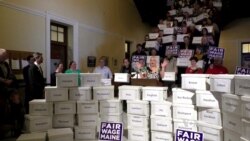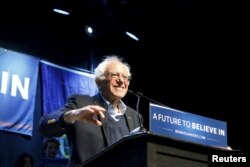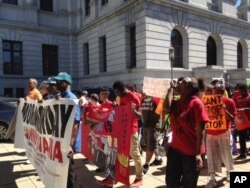Steve Corman believes it is his responsibility to pay a living wage to his employees at Vena’s Fizz House, a bar/restaurant here.
Even though he’s still trying to grow his business and make a profit, Corman sees the hotly contested issue of minimum wage increases as a moral question, not just an economic one.
That’s why he supports a question on the ballot in Maine this election, one that would allow voters to directly affect their state’s economic future. Maine’s ballot question is one of many across the country that would increase the minimum wage and that come at a time when income inequality and job growth hold a central place in the public discussion.
If Question 4 passes, the minimum wage in Maine will gradually increase up to $12 an hour by 2020 and bring the wages of tipped employees, who are paid much less under federal law, up to the level of all other minimum-wage workers by 2024.
Multiple minimum wage proposals have failed in the Maine state legislature, but under the state’s unusually open ballot referendum system, citizens with enough grass-roots support have brought the proposal up for a vote of the people this November.
A teacher for 19 years before opening his restaurant along the Portland waterfront, Corman feels strongly about paying his employees more than the minimum wage. He says he was never able to make enough money as a teacher to hold only one job, and now that he owns his own business, he wants to invest in its growth in many different ways.
"We love for people to learn," he says. "My bartenders are getting tipped for their knowledge, not just for being part of a service industry."
Living off one paycheck
Under federal guidelines, Corman has to pay his tipped employees only $3.75 an hour. Instead, he pays them $9, plus they receive tips from customers.
"On a normal Friday or Saturday, they’re leaving with more than $30 per hour in their hands," he says. "If they can do that two days a week, they can make a living wage."
Corman says that although his cost of doing business would increase, it ultimately benefits his business, resulting in a smaller employee turnover rate and an improvement in the quality of service. Employees are motivated to create new drinks and build relationships with customers because they are not preoccupied with patching together a living.
"This is incredible to be paid that much more," says Hillary Morrison, a bartender at Vena’s. Morrison is just a few years out of college and still finding a way to make a life in this pricey city. She’s balancing all the usual costs of living — rent, food and transportation — while paying off her student loans.
"It just wouldn’t be realistic for me to have this job. I would have to be going between two or even three jobs just to sustain," she says, noting that almost everyone she knows in Portland is juggling multiple jobs.
"There’s just not the same opportunities for everyone out there," she says. "Everyone has different stories and different situations that they’re in."
Top election issue nationwide
Workers across the nation have demonstrated for higher wages, arguing the system can be unforgiving of mistakes or gaps in education.
The Fight for $15 campaign, advocating for raising the minimum wage to $15 an hour nationwide, has been vocal this election season.
Former Democratic presidential candidate Bernie Sanders made Fight for $15 a leading issue in his candidacy, pushing it onto the Democratic Party platform. Hillary Clinton, the eventual nominee, has repeatedly said on the campaign trail that no minimum wage worker should work full time and still live in poverty. She says she supports Fight for $15.
The Republican presidential nominee, Donald Trump, maintains that increases in the minimum wage work best at the state and local levels, allowing for adjustments tied to the economic conditions in specific regions. He has said he would support an increase in the federal rate of up to $10 per hour.
Analysts differ on the economic impact of minimum wage increases on state and local economies. Many argue a raise would allow workers to funnel more money into the economy, while others say it would hurt business owners, causing a negative impact on their spending and forcing them to raise prices.
The Economic Policy Institute, a nonpartisan research organization, found the current federal minimum wage of $7.25 an hour has not sufficiently kept up with rates of inflation, resulting in decreased purchasing power. Additionally, the 2015 study found the U.S. economy could sustain a raise in the federal minimum wage to $12 by 2020.
Economic impact
But Chris Tyll, owner of two restaurants in the Portland area, worries about asking voters to make such a complicated determination.
"We’re asking people to make a decision, 10 seconds in a ballot box, as they look at this question," he says. What voters don’t see, Tyll says, are the historically lean profit margins in restaurants and the local vendors who would suffer when he inevitably had to make cuts in his business to survive. Prices would rise and ultimately end up hurting people who want to spend money in their local economies.
"It’s not that I look at you and say you’re only worth $12 an hour," he said. "That specific task is only worth $11 an hour unless we as a society are willing to pay $30 for a pizza."
Tyll says he understands the important role a living wage plays in people’s lives but sees a wage hike as an artificial way of altering the local economy. He advocates for a range of options to help lower-class workers, including an emphasis on training in skilled trades and bonus systems allowing employees to earn more for good on-the-job performance.
"This is not a minimum wage; this is a tax on your life," Tyll says. "You’re going to eliminate jobs, small businesses are going to close and the industry is going to change."































